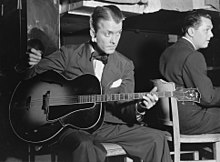Eddie Condon

Albert Edwin Condon , called Eddie Condon, (born November 16, 1905 in Goodland , Indiana , † August 4, 1973 in New York , NY ) was an American jazz guitarist who is part of traditional jazz (especially Chicago jazz ).
life and work
Eddie Condon began his musical career as a ukulele player, but then switched to the banjo and guitar . After playing with various groups in his birthplace, Condon moved to Chicago, where he became one of the most important jazz musicians of the 1920s. In 1922 he played banjo in the Hollis Peavey Band and then (as a banjo player and organizer) with many important Chicago musicians such as Bix Beiderbecke and the groups of members of the Austin High School gang . In 1927 he and Red McKenzie directed the famous recordings of the McKenzie / Condon Chicagoans, who made the Chicago style known. In 1928 he moved to New York and at the same time from banjo to guitar. He starred in Red Nichols ' Five Pennies and Red McKenzie's Mound City Blue Blowers, and recorded with Louis Armstrong and his Savoy Ballroom Five in 1929 . During the Depression he formed the Windy City Seven with Pee Wee Russell and recorded with Artie Shaw , Bobby Hackett and All Star Groups under his own name.
In 1938, as a band leader, he became one of the main artists at the newly founded label Commodore Records . On January 17, 1938, he played there with Commodore # 500, the very first record of the New York record company ( Love Is Just Around the Corner / Ja-Da ). Over time he became famous and played every night at Nick's Jazz Club in Manhattan until 1942 . He played with jazz greats like Armstrong, Mezz Mezzrow and Fats Waller . In 1944/45 he organized weekly concerts in the Town Hall , which were broadcast on the radio. In 1948 he even had his own jazz show on television; In 1962 he appeared in the Goodyear Jazz Concert . Between 1945 and 1967 he was the owner of the New York jazz club "Eddie Condon's" (it existed at 47 West 3rd Street until 1985), which was entirely dedicated to the Chicago style and became a meeting place for intellectuals. He recorded for Columbia in the 1950s and had great success in Newport in 1954 and 1956. In 1957 and 1964 he went on a world tour (to Great Britain, Australia and Japan). Until 1971 he still performed with musicians such as Billy Butterfield , Kai Winding , Johnny Hodges , Wild Bill Davison and Barney Bigard . When playing the guitar, he limited himself to the accompaniment in the rhythm section .
Condon was a heavy whiskey drinker all his life . An emergency operation in 1936 (removal of the pancreas) did not stop this either, but it led to his exemption from military service.
Condon published his autobiography in 1947 and 1973 under the title "We Called It Music".
Discographic notes
- His recordings from 1938 to 1950 are documented on the Classics albums .
- Chicago Jazz (Decca, 1940)
- The Town Hall Concerts Vol. 1-11 (Jazzology, 1944/45)
- Jam Session Coast to Coast / Jammin 'At Condon's (Collectrables, 1953/54)
- Bixieland / Treasury of Jazz (Collectables, 1955/56)
- Midnight In Moscow / The Roaring Twenties (Collectables, 1958/62)
- Confidentially, It's Condon (Gala Records GLP 342, 1958)
Fonts
- The Eddie Condon Scrapbook of Jazz , St. Martin's Press, 1973 (continuation of his autobiography)
- We called's music , Nymphenburger 1960, 1988, revised new edition 2016 (English We Called It Music: A Generation of Jazz New York: H. Holt, 1947) (autobiography)
- Eddie Condon, Richard Gehman (Eds.) Eddie Condon's Treasury of Jazz 1975
literature
- Hank O'Neal: The Man Who Lived Jazz , in: E. Condon: Jazz. We called it music. Langen-Müller 2016
Web links
- Condon at Redhotjazz
- Eddie Condon at Allmusic (English)
- Eddie Condon at Discogs (English)
Individual evidence
- ↑ Gunther Diehl Jazz - we called it music (review) . practice & make music 3/2017, p. 53
| personal data | |
|---|---|
| SURNAME | Condon, Eddie |
| ALTERNATIVE NAMES | Condon, Albert Edwin |
| BRIEF DESCRIPTION | American guitarist |
| DATE OF BIRTH | November 16, 1905 |
| PLACE OF BIRTH | Goodland , Indiana |
| DATE OF DEATH | 4th August 1973 |
| Place of death | new York |
